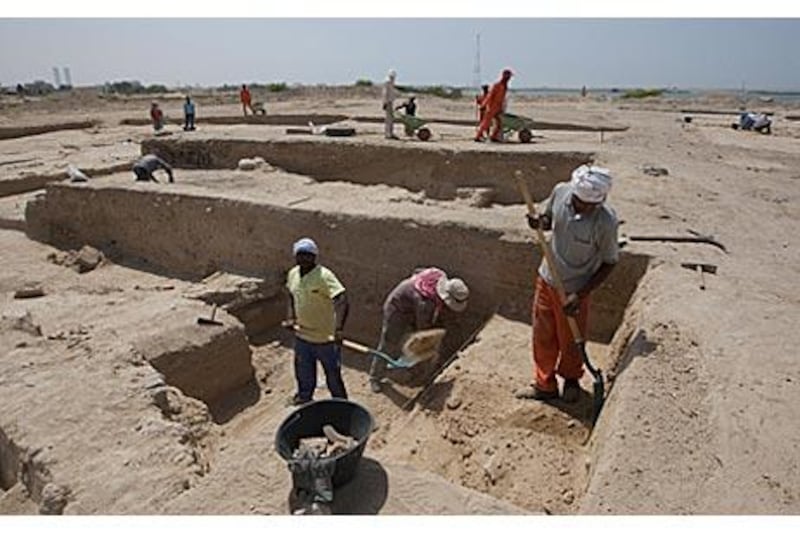RAS AL KHAIMAH // For the archaeologists working on the site, the countdown has begun. The 20-strong party of scientists and aides feel a sense of urgency as they pore over the hard-packed ground, pickaxes, trowels and brushes at the ready.
In less than a month, the searchers will down tools for the last time and turn their backs on a key part of one of the richest archaeological sites in the country before it is to make way for a desalination plant. For more than a decade, researchers have been sifting through the ruins of the once-bustling port city of Julfar, in Ras al Khaimah. Most of the old city has been designated a protected historical site, with a 5km stretch of coastline shielded from redevelopment.
But a small area, measuring about 150 metres by 250 metres, has not been set aside, and it will be lost to history when construction work begins on the desalination project later this year. Thus, a frantic "rescue excavation" is under way as experts rush to salvage as many artefacts as possible before the bulldozers roll in and crack open the baked earth, potentially destroying historical objects as yet unfound.
"Obviously, if we had another three months that would be fabulous because we know now what we are focusing on," said Kevin Lane, the project officer responsible for investigating the site. "But that is just not possible and we have to be pleased that we have the opportunity to come here and investigate the site at all. "The Government has spent a considerable amount of money to fund research into this site. That shows its commitment to archaeology here."
Sources said the Government had spent about Dh1.84 million (US$500,000) to fund the three-month project, which began in January. Julfar was first inhabited more than 1,000 years ago and rose to prominence in the 13th century as a sea-trading hub linking Arabia to South East Asia. At its height, it was home to at least 20,000 people living on both sides of a creek which divided the city into a northern district, known as Al Mattaf, and a southern district, Al Nudud.
Julfar became a rich and powerful pearling and fishing region and was the largest trade centre on the Arabian side of the Gulf. Much of the trade was centred in the northern district, where a fort and defensive battlements have been unearthed by previous archaeological teams. The current project focuses on the southern shore and has uncovered a parade of shops, dwellings and 560 bags of pottery and other artefacts, such as coins and pearl knives.
At the northern site, a series of archaeological digs have been carried out since the 1960s by Iraqi, French, German, Japanese and British teams. These investigations have uncovered many significant finds, including the ancient square fort, the city's perimeter wall and thousands of pieces of pottery from the Far East, highlighting the importance of the city as a stop on the trade route to and from the Orient.
Julfar made international headlines in 1998 with reports that the world's oldest coffee beans had been discovered. These were said to prove that coffee was being traded and consumed 250 years earlier than previously thought. The Ras al Khaimah Department of Antiquities and Museums is helping oversee the dig, which has already uncovered more than half a tonne of pottery, an apparently perfectly intact storage jar and scores of copper-alloy coins, some stamped with Chinese characters.
"It is a shame that some part of the site will be lost but it cannot be helped," said Christian Velde, the department's resident archaeologist. "RAK needs a desalination plant and this is the only suitable area. You have to be practical and professional about it. Better to do a rescue excavation of the site rather than no excavation at all." Knowing that the area will be run over by bulldozers can have its advantages.
"There is a floor area we have found," Mr Velde said. "Normally, we would not be able to see underneath it because that would mean damaging it, but because the whole site is going to be destroyed, it doesn't matter. "We are going to get down under the floor and see if there are other floors below it. It will be sad when we have to stop work on the site, but it always is, whether it is a rescue evacuation or not.
"At least we know we have saved some useful finds and developed an understanding of how the communities lived." Peter Hellyer, an archaeologist and historian who has written a book on the history of the region, said the site was of "enormous" significance. "The importance of Julfar is two-fold," he said, "both as part of the history of the UAE and the spread of Islam throughout the region. "There is an inaccurate but widespread belief that the UAE didn't have that much in the way of history prior to the discovery of oil, but Julfar shows that this area was an important entrepôt for international trade in the region.
"There has been quite a lot of work done on the site already, and although it will be a loss, [the desalination plant] is part of progress. You can't protect everything." The Federal Electricity and Water Authority is constructing the new water plant. The National was unable to contact anyone at the agency. "You have to strike a balance between the needs of today, tomorrow and the past," Mr Heller said, "and the RAK Government does strike a good balance."
chamilton@thenational.ae






